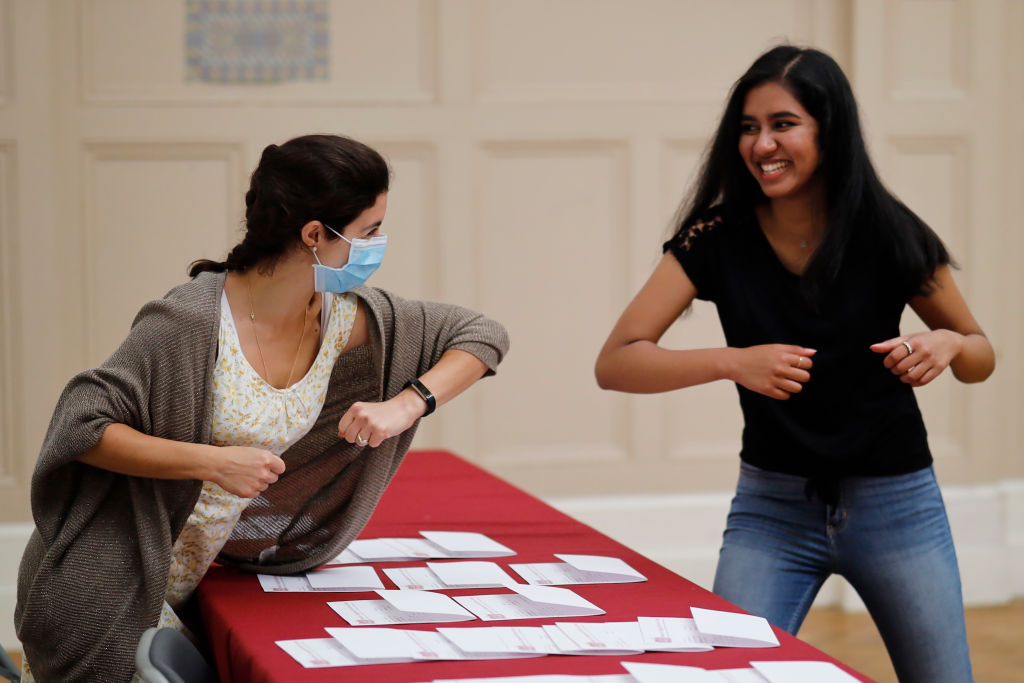I had just finished my last day teaching at school when I found out: it had been a blur of Microsoft Teams training, unexpected farewells to pupils and packing up suitcases full of books. Much like my students, I was exhausted, apprehensive, and more than a little confused. I turned the radio on, and that’s when I heard Boris Johnson’s announcement: ‘Exams will not take place as planned in May and June, though we will make sure that pupils get the qualifications that they need and deserve for their academic career.’
Five months later, it is clear that not all A-level pupils have got the qualifications that they need, and that even more have not got the qualifications they deserve. Universities must acknowledge this, and they must do so quickly.
Scotland’s U-turn this week was the first definitive proof that this new grading system is a shambles. After down-marking over 100,000 exam grades, the government has since reversed its policy and is now restoring students’ results to those recommended by teachers (and who knows what impact this grade creep will have on the current cohort, or next year’s.) Gavin Williamson then promised at the eleventh hour that students’ results would not be lower than their mock grades, but this also raises issues of inconsistency. Many schools deliberately mark students down in mocks in order to incentivise them to work harder, while many other schools mark much more generously than exam boards with notoriously low grade boundaries.
Williamson did not need a magic crystal ball to foresee the conflict at the heart of this process. On the one hand, schools are under immense pressure to inflate grades in a world driven by league tables and progress markers; Ofqual predicted that, without standardisation, the number of A*s and As would be 12 percentage points higher than last years. On the other hand, national policymakers are under equal pressure to ensure that grades meet arbitrary quotas and are roughly in line with previous results.
Rather than finding a sensible compromise, this push-pull tug-of-war has reached breaking point; the result is an unclear, muddy mess.
Universities should appreciate that, even with the best of intentions, the system was never going to be completely fair. Algorithms are constrained by a limited number of variables; a pupil’s individual academic achievement is not.
The schools’ grading systems inevitably favoured consistent hard workers (typically teenage girls), instead of late improvers and students who work better under exam conditions (typically teenage boys). Subjects with a large uptake have also been disproportionately affected by downgrading.
Centre-assessed grades were not necessarily reliable either. I know teachers at independent schools who have been encouraged, goaded, and even blackmailed by pushy parents who want to ensure that they get the results they are paying for. I also know teachers at state schools who simply didn’t have enough recent concrete evidence of pupil progress post-lockdown, and were relying on data that was a year old. I also know teachers who spent hours trying to contort their predicted grades to match historical trends, even though academic ability can vary wildly from year group to year group, only to be now told that this doesn’t matter under the ‘triple lock’ system.
Last week, Ofqual belatedly clarified the appeals process, explaining that schools, not individual pupils, could challenge results – but only if they can prove that the historical data used to standardise grades did not reflect the school’s current circumstances – and they will have to pay a fee to do so. Students can re-sit in the autumn, but by then they are committing to a gap year at a time when opportunities for both travel and work are extremely scarce.
Universities should not rely on this fraying tightrope. Instead, they should accept students for all the reasons they gave them an offer in the first place: their personal statements, their previous academic record, and their references.
A-level results matter, but in these extraordinary and unprecedented circumstances, universities must show flexibility. Many universities have already promised leniency, but time is of the essence – if they do not make their offers quickly, many students, desperate for some certainty amongst the chaos, will turn to clearing.
Oxford and Cambridge in particular should be open-minded and remember that their interviews have told them far more about how a candidate will thrive in a tutorial setting than an A-level grade; if they are too rigid in their offers, they risk missing out on teaching high-achieving pupils simply because of a letter on a piece of paper determined by quotas, historical trends and postcodes.
By all means let schools appeal, but do not cause students unnecessary anxiety whilst they wait through a process that will no doubt be lengthy, bureaucratic, complex and equally flawed. Give them a place based on their potential, not on our current politics.
Kristina Murkett is an English teacher at a school in London






Comments